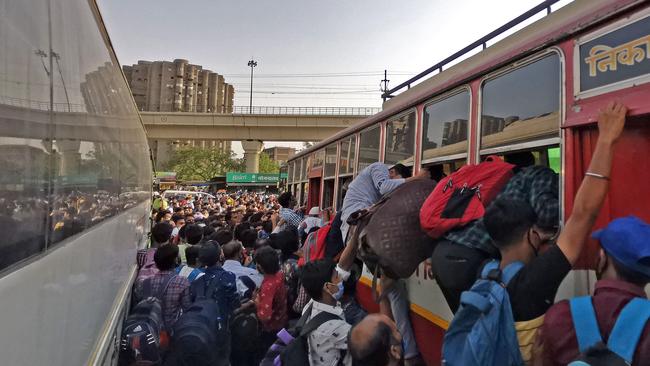Covid-19 variant shuts Indians out of UK
British ministers have been accused of waiting too long to impose a travel ban on India after it was disclosed that thousands had arrived from the country since a coronavirus variant emerged.

British ministers have been accused of waiting too long to impose a travel ban on India after it was disclosed that thousands of people had arrived from the country since a coronavirus variant emerged.
Health Secretary Matt Hancock said on Tuesday AEST that the government had taken the “difficult but vital decision” to put India on the travel red list after the number of confirmed cases of the variant in Britain rose to 103, with some catching it in the UK.
It will mean that from Friday returning UK residents will have to quarantine in a government hotel for 10 days while other travellers will be refused entry.
Prime Minister Boris Johnson cancelled a trip to India next week on which he had hoped to set out plans for a post-Brexit free-trade deal and secure millions of vaccine doses for Britain.
It is estimated that about 900 people a day arrive in Britain from India, with five flights from the country on Monday.
Hong Kong also introduced an emergency ban on all flights from India after at least 49 passengers on a flight from Delhi tested positive for coronavirus.
Authorities imposed a two-week ban on all flights from India, Pakistan and The Philippines, categorising the countries as “extremely high risk” after detecting the N501Y mutation for the first time.
There are now more than 200,000 confirmed COVID cases a day in India, 20 times as many as two months ago, forcing fresh lockdowns in its biggest cities and leaving health systems struggling.
There are fewer than 100 intensive care beds left in Delhi, and patients have to share beds or sleep in car parks in Mumbai.
The lockdown from Monday night sparked a crush at a major bus terminal in Delhi, with tens of thousands of migrant workers trying to flee the restrictions — fuelling fears they could spread the virus to their rural hometowns.
The variant that emerged in India last year has two mutations that, it is feared, could help it to partly evade the present vaccines. This has yet to be confirmed and scientists believe that jabs will be enough protection from serious illness.
The British government is keen to build relations with India and had hoped to use Mr Johnson’s visit to announce a target to double British trade with the country to £50bn ($90bn) by 2030. It is also negotiating to secure the release of five million doses of the AstraZeneca jab made by the Serum Institute for India. The Labour Party said there had been warning signs from India for weeks. Opposition home spokesman Nick Thomas-Symonds said it was “not good enough to try and shut the door after the horse has bolted, by adding countries on to a red list when it is too late”.
Another Labour MP, Yvette Cooper, said at least 16 more flights would arrive by the time the policy was implemented and urged ministers to act faster.
“The India variant has been under investigation for almost three weeks and other neighbouring countries with lower rates of infection were added to the red list 10 days ago,” she said.
Ministers argue that the threat from the variant became evident only in the past week, and Mr Hancock insisted decisions had been taken even before tests on it had been completed.
He also said ministers were stepping up plans to “design new vaccines specifically targeted at the variants of concern” for an autumn booster for the vulnerable. He added that tests were being developed to spot variants without the need for genetic sequencing.
Professor Paul Hunter of the University of East Anglia said the variant was spreading faster than any other in Britain.
“If this is more resistant to vaccines — even if it is not as infectious as the Kent variant — it’s a big problem,” he said.
The Times



To join the conversation, please log in. Don't have an account? Register
Join the conversation, you are commenting as Logout